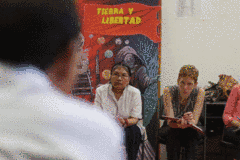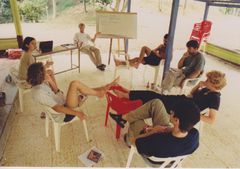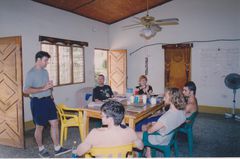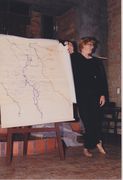
Image above courtesy of the Mexican Commission for the Defense and Promotion of Human Rights (CMDPDH), taken during an international mission trip to Mexico in 2014.
The image above and the images below are from Eleanor's PBI field service work in Colombia in 1999 as a PBI field volunteer.
Working for PBI propels you into a world where defending human rights is a matter of life and death, and the people you accompany are amongst the more committed, knowledgeable and savvy activists you could hope to meet. Working for a PBI project provides an intense apprenticeship in human rights, and experience and insights you gain are likely to inform your future human rights work deeply and most definitely for the better.
In all the work I have done since PBI I have drawn heavily on my experience in the PBI Colombia project and then volunteering for PBI UK. Currently I lobby hurried diplomats down the corridors of the UN, miles from the jungle paths and waterways we navigated with defenders in Urabá. However the struggles of defenders we then accompanied serve as a baseline for assessing the utility of strategies and tactics I now contribute to working for International Service for Human Rights (ISHR) in New York.
My current job involves pushing for coherent and progressive national and foreign policy positions in regard to the protection for human rights defenders and safeguarding the space for civil society to operate. With PBI I learned the building blocks defining advocacy strategies, rooted in close and continuous readings of the context, challenges and opportunities for change. PBI understands the mechanics of how national and foreign policy is defined, and analysis of socio-political developments is a constant in their work. I learned about engaging with the hierarchies of diplomatic corps – from diplomatic missions to Foreign Ministries – which has put in me good stead for engagement with States in inter-governmental bodies and processes. Understanding how State positions are influenced by a range of factors, including personal commitment of individual diplomats, is something I gained experienced in during my time with PBI in Colombia and have incorporated in my work since.
Nowadays I have the occasional opportunity to spend time back in countries where PBI operates. Last year I was lucky to be part of a mission to Mexico organized by NGOs working locally including PBI Mexico to evaluate the implementation of the 2012 Law for the Protection of Human Rights Defenders and Journalists. Members of the MEP accompanied us in the mission as we travelled to meet with a range of stakeholders, including defenders. Our visit coincided with the terrible events in Ayotzinapa which revealed the extent of human rights abuse and impunity in the country. In a trip to the school in Ayotzinapa we were able to express solidarity with the family members of the disappeared students.
The trip reminded me that at its heart PBI is an expression of active solidarity. I have always greatly valued that. PBI understands that central to human rights work is working out what you can best contribute to the overall effort. PBI uses the power of the passport to the advantage of defender communities. It is an organization that taps into and builds activist networks of solidarity and action.
Current and ex- PBI people are all over - you find ex-PBI people working in many other human rights organisations and bodies. The common PBI experience is always a door opener and ice breaker. On meeting someone who has also worked at PBI I immediately know we’ll have a common understanding on certain basic things, and that accelerates building ties for future work together.
It wouldn’t be everyone’s idea of fun to live and work with people 24 hours a day, as we did in Colombia with PBI. However, there is no doubt you learn about group dynamics, how to navigate conflict, and how you build friendships based on an immensely intense and rich experience.
PBI’s model of work is both simple and highly sophisticated. For me working for PBI in Colombia has been without a doubt my most significant professional experience. During that time, we all felt great anger in the face of the violations against defenders, and experienced fear and a sense of impotence. However, truly the strongest take away from the experience was one of the power of community and of hope. Through the defenders you accompany and colleagues you work with, PBI is an organization that gives hope. The experience of working with PBI demands you take that hope and commitment with you as you go on to contribute in your way to other human rights struggles. That is an invaluable thing to learn.
- Eleanor Openshaw




